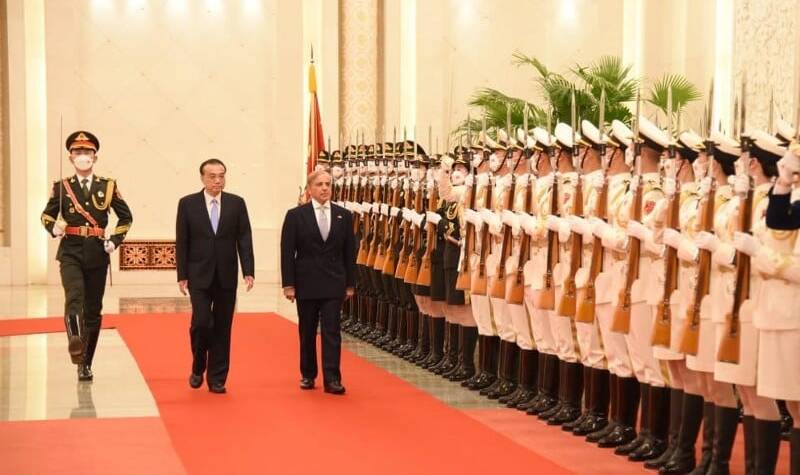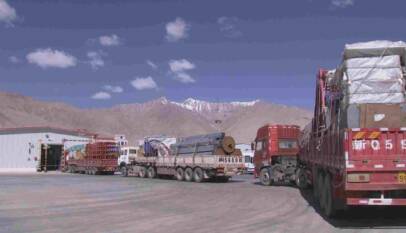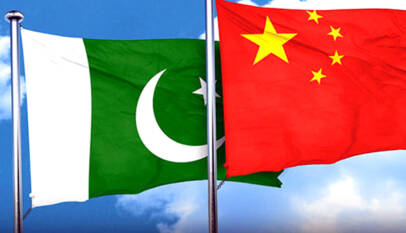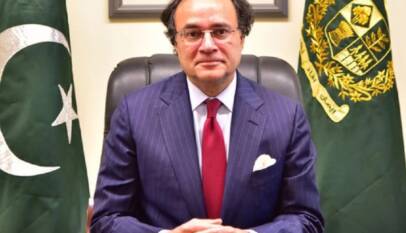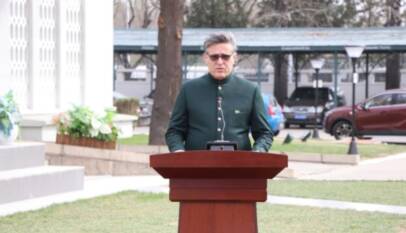Pakistan, China reaffirm resolve to cement strategic ties;CPEC put firmly back on track
Pakistan and China committed to extensive cooperation in several sectors, especially in the key development sectors related to the Belt and Road Initiative (BRI) and the China-Pakistan Economic Corridor (CPEC). In a joint communique put out simultaneously by Pakistan and China, the two sides said they had detailed exchange of views on a broad segment of topics including bilateral relations, CPEC projects, flood rehabilitation, economic prosperity, terrorism, e-commerce, poverty alleviation, defence, tourism, regional peace and security among others. The two sides agreed on the importance of the China-Pakistan all-weather strategic cooperative partnership amidst the emerging global challenges.China stated that relations with Pakistan will always be given the highest priority in its foreign policy. This was reciprocated by Pakistan which underscored that Pakistan-China relationship is the cornerstone of its foreign policy and both sides reiterated their mutual support on issues concerning each other’s core interests.
Pakistan and China on Wednesday injected a new vigour into the multibillion-dollar China-Pakistan Economic Corridor (CPEC) with a push to extend the flagship programme of the Belt and Road Initiative (BRI) to Afghanistan.
The joint statement was issued after Prime Minister Shehbaz Sharif’s visit to Beijing where he met Chinese President Xi Jinping, Prime Minister Le Keqiang and other senior leaders who spoke about a range of issues covering CPEC, trade and commercial ties, regional and other international issues.
It was the first visit by the prime minister to Beijing since he took charge in April. Pakistan had high hopes from the trip that took over six months to materialise. Given Pakistan’s precarious economic situation, the government was hoping to get some financial assistance from China besides accelerating the CPEC.
While the joint statement did not mention that China would consider Pakistan’s request for restructuring of $6.3 billion debt, the two sides agreed to build on the consensus on ML-1, a key strategic project of CPEC, for its earlier implementation.
“Recognising that ML-1 is a project of key significance under the CPEC framework and of importance to Pakistan’s socio-economic development, the two sides agreed to build upon the leadership consensus and to advance the process of its earliest implementation. They also agreed to actively advance the Karachi Circular Railway, which was an urgent requirement for Pakistan’s biggest city,” the joint statement read.
The ML-1 has long faced delays which have led to a substantial increase in its cost from the original $6.6 billion to $10 billion.
The statement noted that the Chinese leaders appreciated the long-standing commitment of PM Shehbaz to China-Pakistan friendship. Shehbaz reaffirmed Pakistan’s commitment to further strengthen and deepen Pakistan-China All-weather Strategic Cooperative Partnership and enhance practical cooperation in all areas.
The two sides held an in-depth exchange of views on bilateral relations as well as the regional situation and international political landscape. The two sides agreed on the importance of the China-Pakistan All-weather Strategic Cooperative Partnership amidst the emerging global challenges. The meetings were marked by traditional warmth, mutual strategic trust and commonality of views.
The leaders reaffirmed that close strategic ties and profound friendship between China and Pakistan were time-tested and resilient. China-Pakistan friendship is a historic choice of both peoples that serves the interests of the two countries. The Chinese side reiterated that relations with Pakistan will always be given the highest priority in its foreign policy. The Pakistani side underscored that the Pakistan-China relationship is the cornerstone of its foreign policy and that the Pakistani people always support the closest friendship between the two countries.
Both sides reiterated their mutual support on issues concerning each other’s core interests. The Pakistani side expressed its commitment to the one-China Policy and support on issues of Taiwan, South China Sea, Hong Kong, Xinjiang and Tibet. The Chinese side reaffirmed its support for Pakistan’s sovereignty, territorial integrity, security, and promoting its socio-economic development and prosperity.
The Chinese leadership expressed condolences and sympathies on the recent loss of life and property as a result of the unprecedented floods in Pakistan. PM Shehbaz expressed appreciation for the timely and generous assistance extended by the government and people of China, including the provision of disaster relief supplies, the contributions of Chinese expert teams on post-disaster assessment and health care to assist with damage assessment, experience sharing in post-disaster reconstruction and rehabilitation, and post-disaster disease response to step up capacity of medical treatment.
China’s mobilisation of assistance was a vivid reflection of the time-tested All-Weather Strategic Cooperative Partnership between the two countries.
PM Shehbaz briefed the Chinese leadership on the post-flood relief and rehabilitation efforts. The Chinese side expressed its resolve to stand by Pakistan in these difficult times and to continue offering assistance to Pakistan in the latter’s plans for the rehabilitation of the affected areas.
Both sides reviewed with satisfaction the outcomes of the three sessions of the Foreign Minister’s Strategic Dialogue and agreed to hold its next meeting at the earliest possible in the first half of 2023 in Islamabad.
The two sides noted the key role of various bilateral cooperation mechanisms for deepening strategic communication and welcomed the holding of the Spokespersons Dialogue and the Consultations on Arms Control and Disarmament.
The prime minister reaffirmed his government’s willingness to commit to high-quality development of the Belt and Road Initiative (BRI) and highlighted the salience of the China-Pakistan Economic Corridor (CPEC), a flagship project under BRI, to Pakistan’s economic and social development.
The leaders took note of the convening of the 11th CPEC Joint Cooperation Committee (JCC) on 27 October 2022, which reviewed the progress of ongoing projects and agreed to continue the momentum of CPEC’s high-quality development.
Recognising the significance of the Gwadar port as the leading project of CPEC and an important node in cross-regional connectivity, both sides expressed satisfaction with the completion of key projects and agreed to speed up progress on other related projects of the Gwadar port and free zone.
In line with the leadership’s consensus to accelerate cooperation in the areas of agriculture, mining, IT, and socio-economic development under CPEC, the two sides agreed to further build on the health, industry, digital and green corridors launched earlier this year and carry out relevant cooperation.
The Chinese side appreciates the efforts of the Pakistani government to vigorously develop renewable energy projects including solar projects which aligns with the green, low carbon and environmental development of energy sector, and encourages participation of Chinese companies in this Pakistani endeavour.
The two sides agreed to actively promote the implementation of Framework Agreement on Industrial Cooperation to support Pakistan’s industrial development.
Both sides expressed their strong determination to counter all threats and designs against CPEC and China-Pakistan friendship. Pakistan reaffirmed its commitment to the safety and security of all Chinese personnel, projects and institutions in Pakistan. The Chinese side appreciated Pakistan’s strong determination and vigorous measures in this regard.
Noting completion of a decade of CPEC’s remarkable achievements in 2023, the two sides expressed satisfaction with CPEC’s contribution to the socioeconomic development of the two countries.
The two sides noted that the recent meeting of the CPEC Joint Working Group on International Cooperation and Coordination (ICC) had highlighted that CPEC was an open and inclusive platform. Both sides welcomed interested third parties to benefit from investment opportunities in the priority areas of CPEC cooperation such as industry, agriculture, IT, science and technology, and oil and gas.
The two sides noted the steady increase in bilateral trade volume since the operationalisation of the second phase of the China-Pakistan Free Trade Agreement. Both sides resolved to further coordinate to enhance trade liberalization under the second phase of CPFTA and agreed to convene an early meeting of Committee on Trade in Goods.
The Chinese side expressed willingness to actively support the Pakistani side in expanding export to China and welcomed quality goods including food and agricultural products from Pakistan to enter the Chinese market.
It was further agreed to encourage investments and partnerships in the export-oriented sectors of Pakistan which would contribute to achieving sustainable bilateral trade growth. The two sides agreed to conduct a joint study to further enhance bilateral economic and trade cooperation.
The two sides agreed to fully leverage overland trade and exchanges by upgrading facilities at Khunjerab border port and strengthening cooperation on epidemic containment and customs clearance in border areas.
They also agreed to work together to further strengthen the implementation of the Quadrilateral Traffic in Transit Agreement (QTTA), which is an important pillar of regional connectivity.
Acknowledging the massive size of China’s e-commerce market and its potential to further bolster bilateral trade, the two sides welcomed the signing of an MOU on e-commerce and jointly supported the establishment of Pakistan’s country pavilions on China’s e-commerce platforms. The two sides agreed to further strengthen cooperation on online payment systems, logistics, warehousing and customs facilitation, and enhance collaboration between start-ups and micro, small and medium-sized enterprises.
The two sides noted that the first meeting of the China-Pakistan Joint Working Group on Trade, Investment and E-commerce and the China-Pakistan Poverty Reduction and Social Development Forum were held this year, and exchanges and docking activities in the pharmaceutical, agricultural and shoe-making industries as well as capacity building courses on poverty reduction were organized. China is willing to continue relevant practical cooperation with Pakistan to contribute to poverty reduction and socioeconomic development in Pakistan.
The Pakistani side commended China’s remarkable achievement of lifting over 800 million people out of absolute poverty. Noting the displacement of millions of people due to the recent floods in Pakistan, the Chinese side agreed to support the Pakistani government in recovering the economy in disaster-hit areas, including through the Benazir Income Support Programme.
The two sides agreed to keep in close communication to provide further facilitation for Pakistani students to come to China. PM Shehbaz thanked the Chinese leadership for the return of Pakistani students to Chinese education institutions.
The two sides agreed to inject new impetus into people-to-people contacts, tourism cooperation and cultural exchanges between the two countries, appreciated the role of the cultural cooperation agreement between the two governments and its executive programmes and welcomed the extension of the current executive programme to 2027.
The two sides further welcomed the decision to celebrate China-Pakistan Year of Tourism Exchanges in 2023 and the organisation of a Gandhara Art Exhibition at the Palace Museum in Beijing in 2022-2023.
Noting the gradual resumption of flight operation between the two countries, the two sides agreed to further increase the frequency of direct flights including between Islamabad and Beijing in due course.
Both sides expressed satisfaction with the close cooperation, trust and communication between the armed forces of the two countries. Underscoring that stronger strategic defence and security cooperation between China and Pakistan is an important factor of peace and stability in the region, the two sides agreed to maintain high-level mil-to-mil visits and exchanges and deepen cooperation in areas of training, joint exercises and military technology.
The two sides condemned terrorism in all its forms and manifestations, and expressed opposition to the politicisation of the issue of counter-terrorism. China recognised Pakistan’s contributions and sacrifices in the fight against terrorism. The two sides agreed to further enhance counter-terrorism cooperation to promote international peace and security.
The two sides reiterated that a peaceful and prosperous South Asia is in the common interest of all parties. They emphasised the importance of resolving all outstanding disputes through sincere dialogue. The Pakistani side briefed the Chinese side on the situation in Jammu and Kashmir. The Chinese side reiterated that the Kashmir issue was a dispute left from history that should be properly and peacefully resolved based on the UN Charter, relevant UN Security Council resolutions and bilateral agreements.
On Afghanistan, the two sides agreed that a peaceful, prosperous, interconnected and stable Afghanistan is fundamental to regional prosperity and progress. They expressed satisfaction with the outcome of the three Foreign Ministers’ meetings of the six neighbouring countries of Afghanistan and looked forward to the next meeting to be held in Uzbekistan.
The two sides underscored the need for the international community to provide continued assistance and support to Afghanistan including through unfreezing of Afghanistan’s overseas financial assets. The two sides agreed to continue their humanitarian and economic assistance for the Afghan people and enhance development cooperation in Afghanistan, including through CPEC’s extension to Afghanistan.
The two sides signed and concluded a number of agreements/MoUs, covering bilateral cooperation in areas of e-commerce, digital economy, export of agricultural product, financial cooperation, protection of cultural property, infrastructure, flood relief, post-disaster reconstruction, GDI, animal disease control, livelihood, cultural cooperation, space, geosciences as well as law enforcement and security.
Ambassador Khalil Hashmi underscores China’s leadership in global economic development
Major initiatives and visions proposed by China align with current global needs and trends…



